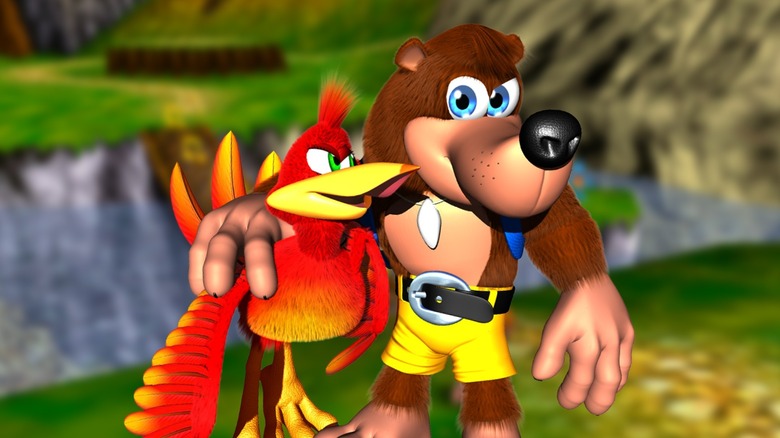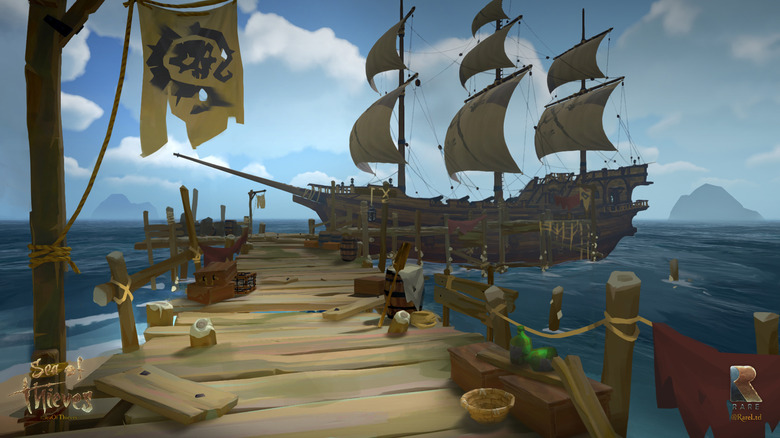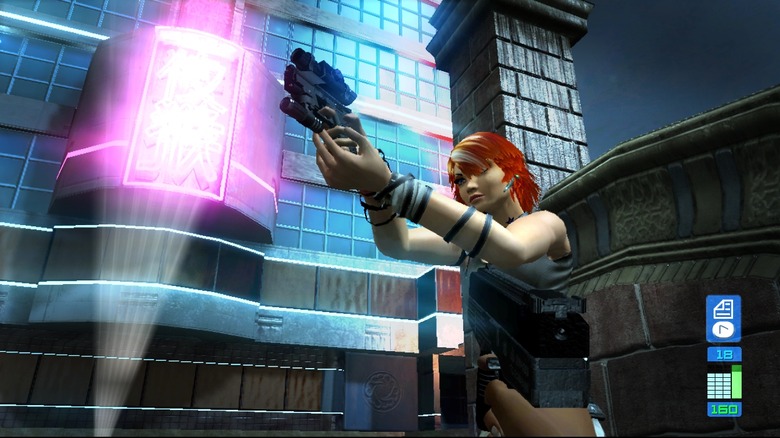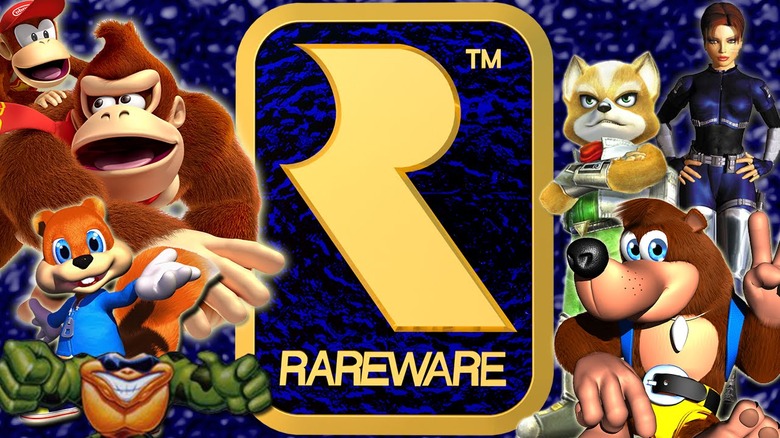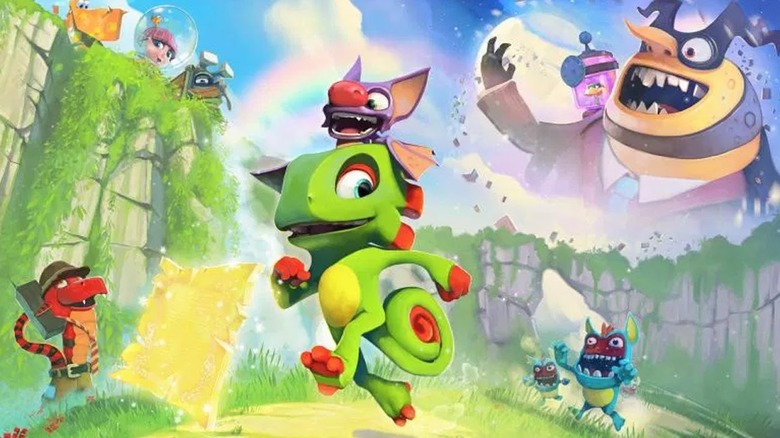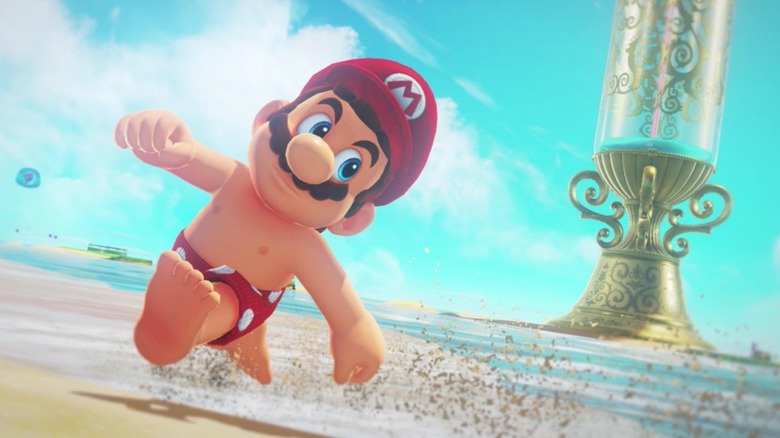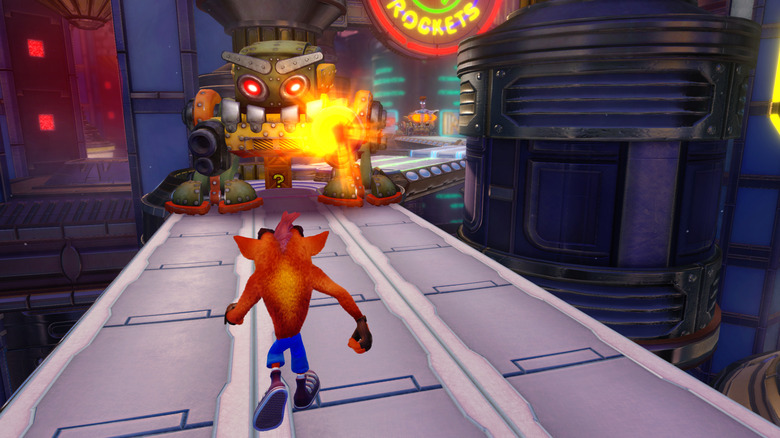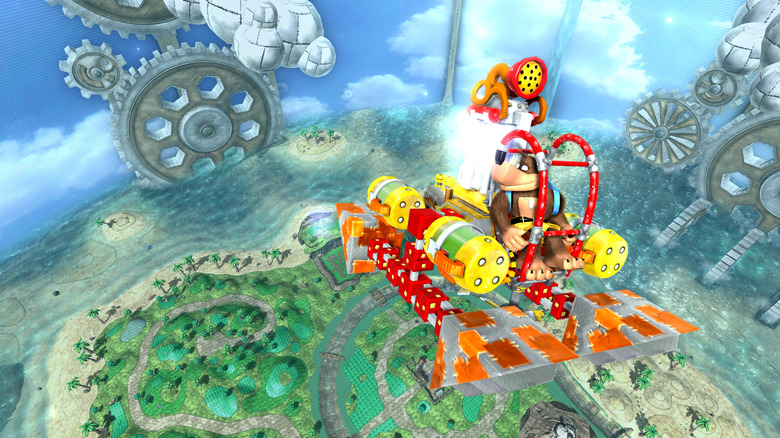Why Microsoft Won't Release Banjo-Kazooie 3
Way back in 1998, the video game world was vastly different than it is today. Sega was still producing hardware; Sony was but a fledgling player in the space, only having released the original PlayStation three years earlier; and Rare — a storied development studio based in England — was still part-owned by Nintendo.
On June 29, 1998, Rare released a 3D platformer called Banjo-Kazooie for the Nintendo 64, which both paid homage to the genre-defining done by Super Mario 64 before it, and also introduced new, innovative mechanics of its own. Not only that, the title featured two adorable characters who worked together to run, jump, and fly across the lands: Banjo, a bear, and Kazooie, a bird.
Fans fell head over heels in love.
That game spawned a sequel, called Banjo-Tooie, in 2000. But after that, Rare was sold to Microsoft and began a new journey on a completely new console. And the traditional platforming found in the first two Banjo games was never seen again. Fans often wonder aloud whether Microsoft and Rare will allow Banjo and Kazooie to come back for a brand new adventure, but the truth is, it's just not going to happen.
Here's why you're never going to see a Banjo-Kazooie 3.
Rare is quite busy with Sea of Thieves
For a long time, Rare toiled in Microsoft's Kinect dungeons. The studio was tasked with making software for the company's ill-fated motion peripheral, and doing so meant a long pause on Rare's past properties, as well as any new ideas it could dream up. It was a sad time, especially for those who'd grown up playing Rare games on Nintendo consoles.
Fortunately, the Kinect bit the dust, and Rare got a chance to spread its wings once more. Unfortunately, the type of game the studio chose to make means it doesn't have a lot of bandwidth available for other projects.
Sea of Thieves is a shared-world pirate adventure game, full of big ships, buried treasure, and all the sword fights and cannon blasts you'd expect in a pirate game. And it's Rare's first game in the post-Kinect world — one that is constantly being updated with new adventures and loot for players to discover. But making an always-online living game takes development resources. Rare at one point had three teams working on updates to Sea of Thieves, which means that a whole lot of the studio was focused on one product.
That doesn't leave much left for a Banjo-Kazooie 3.
Microsoft has let a lot of favorite IPs languish without bringing them back
To discover some of Microsoft's most treasured yet still forgotten franchises, you can take a look at the original Xbox and the Xbox 360, which featured games like Amped, Crimson Skies, and Jade Empire. None of those titles have seen new entries in well over a decade, so when you consider that Microsoft has no problem leaving its own promising intellectual properties in the past, is it any surprise that the company would do the same to Rare's?
Rare, now owned by Microsoft, can't return to Nintendo's Donkey Kong Country series. But the studio has invented plenty of new gems along the way, including Perfect Dark, Viva Pinata, and of course, Banjo-Kazooie. A new Banjo game could theoretically fill a much-needed role in the Xbox One lineup, which is more action and shooter oriented. But Microsoft seems content to let its own history fade away, and as a by-product, Rare's is fading right along with it.
Microsoft has its tentpoles going forward. Past franchises don't fit into its future plans. And that means no more Banjo.
The Rare of today is far different than the Rare of Banjo's heyday
Nintendo-era Rare was entrusted with some of Nintendo's biggest IP. The company handled the Donkey Kong Country franchise. It created Diddy Kong Racing as a new spin on the kart-racing genre. And it developed Star Fox Adventures for the GameCube, which some might argue was the last good Star Fox game. But even while it was making games for Nintendo franchises, Rare was also building its own unique experiences. Throughout the SNES and N64 eras, Rare developed Jet Force Jemini, Blast Corps, Killer Instinct Gold, GoldenEye 007, and numerous other titles.
But something changed when Rare joined Microsoft in 2002. Whether it was because Rare struggled under a larger, more controlling company, or as former Xbox head Peter Moore put it in 2008, "their skillsets were from a different time and a different place," the acquisition wasn't as successful as everyone hoped.
Since then, turnover has happened, and the mission at Rare has changed. It's no longer on Rare to try to "recreate the glory years" as Peter Moore also stated. Rather, the studio is trying to figure out how it can appeal to modern-day gamers. And that, unfortunately, means it won't be making another Banjo game.
Many from the Banjo team left Rare and worked on the indie game Yooka-Laylee
Some at Rare did not like the studio's new direction under Microsoft — especially when it came time to go all-in on the Kinect. Many left the studio to pursue other opportunities, but not all of those who departed were ready to give up the dream of making another Banjo-Kazooie-style game, even if they couldn't use that particular intellectual property. Thus Yooka-Laylee was born — the result of a 2015 Kickstarter that raised nearly $3 million.
The characters in Yooka-Laylee capture a vibe that should seem pretty familiar to Banjo fans. There are two named characters who work in tandem, with one character being carried by the other (just as Kazooie was carried by Banjo in his backpack). The game hoped to fill the hole left by the absence of the Banjo franchise, and to its credit, the game managed to remind players of both the good and bad parts of '90s platformers.
But the game didn't set the world on fire. It drew a lot of interest from the hardcore Banjo fans who supported it, but didn't have much mainstream appeal. The reception to Yooka-Laylee is a good indicator of how a new Banjo game would be received, and based on that, it's understandable why a BK3 isn't in the cards.
3D platformers outside of Mario don't seem to catch on these days
Yooka-Laylee's muted reception in the video game zeitgeist isn't unique. You can point to a number of 3D platformers, whether they're titles like Ratchet & Clank or Super Lucky's Tale, and start to gain a clearer picture about where this genre stands in the modern-day landscape of video games.
They just aren't that popular anymore, save for one: Mario.
Every 3D Super Mario game seems to defy the odds. Whether it's because Mario is so well known, or because Nintendo has rarely made a bad Mario game — well, that's anyone's guess. But games starring Nintendo's hat-wearing plumber have always sold like hotcakes, even when the company's systems haven't. If Nintendo needs some money, they can throw a Mario title out to the masses and reap the benefits. That's the kind of pull a lot of video game franchises would kill for, but not many have.
Banjo-Kazooie, unfortunately, will never be the kind of game that can overcome the market sentiment toward 3D platformers. And that's why we'll never see a new one.
Most older IPs have been brought back as remasters instead of reboots
Gamers may not have much interest in new 3D platforming games outside of the Mario series. But remasters? That's an entirely different story. Remasters and "definitive editions" have been the hallmark of the current console generation, and 3D platformers have taken advantage. Games like the Crash Bandicoot N-Sane Trilogy have resurrected our favorite gaming moments from the late '90s and early 2000s, and with other titles like the Spyro Reignited Trilogy on the way, it appears that game companies may not want to make new 3D platformers, but might be willing to remaster their old ones and sell them again.
Why is this? What makes a remaster sell but a new game flop? Nostalgia.
With an updated, graphically enhanced version of a title from their childhood, adult gamers already know what they're getting. They want to play the games they loved years ago, but experience them with rose-colored glasses that take the form of prettier visuals and improved controls. When you also consider the fact that remasters are far less work than new games, the retro 3D platforming renaissance makes a lot more sense.
Both Banjo-Kazooie and Banjo-Tooie were remastered for the Xbox 360 and are now playable via the Xbox One's backward compatibility feature, as is Banjo-Kazooie: Nuts & Bolts. So not only are we unlikely to see a brand new Banjo title — we probably won't get newer remasters of the older games, either.
It's simply been too long
The last Banjo-Kazooie title came out in 2008. And Banjo-Kazooie: Nuts & Bolts turned out to be the last time your favorite bear and bird team showed up in a brand-new title together. But here's a dirty little secret: Nuts & Bolts deviated wildly from the original BK formula. It wasn't a 3D platformer so much as a vehicle-building game. So if you're looking for the last game in the traditional Banjo mold, you have to go all the way back to the year 2000. That's when Banjo-Tooie came out, and that's the final time gamers got to experience Rare's platforming gameplay in all its glory.
Way too much time has passed since then.
At this point, young kids — the target market for a Banjo-Kazooie 3 — might not even know who the two characters are. And if they're at all familiar with the franchise, it's more likely due to Nuts & Bolts than any of the early platforming titles.
It's the sad reality of letting an IP lay dormant for so long. It's been two decades since Banjo and Kazooie first showed up on a console, and now it's likely most people who play games don't even know who they are.
That's not a good recipe for a comeback.

